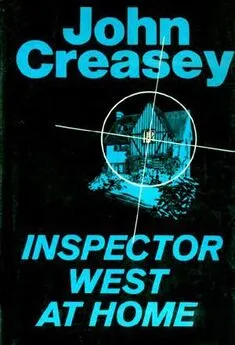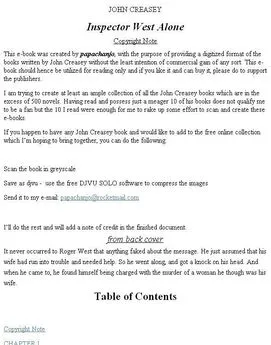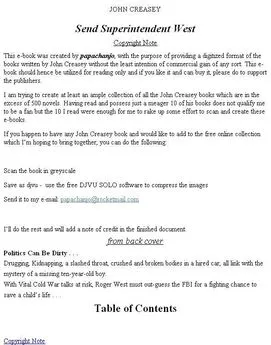John Creasey - Triumph For Inspector West
- Название:Triumph For Inspector West
- Автор:
- Жанр:
- Издательство:неизвестно
- Год:неизвестен
- ISBN:нет данных
- Рейтинг:
- Избранное:Добавить в избранное
-
Отзывы:
-
Ваша оценка:
John Creasey - Triumph For Inspector West краткое содержание
Triumph For Inspector West - читать онлайн бесплатно полную версию (весь текст целиком)
Интервал:
Закладка:
“Come in, and pull up a chair,” he invited. “As you weren’t here, I sent for Turnbull over this Halliwell business.”
Roger stopped, with a hand on cold steel.
“Who, sir?”
“The dead man, Halliwell. He served three years for fraud, and had been out about three months.”
Turnbull was grinning.
“I can guess what you’ll think about that,” Chatworth remarked, as Roger sat down. “If Raeburn is what you think, he’d have good reason for killing any man who could shop him. So I want you and Turnbull to concentrate on Raeburn, but don’t let it get round that you think it might be anything but manslaughter. The Legal Department doesn’t think we can get him remanded in custody, but at least you’ve an opportunity to dig.”
“I’ll dig deep,” promised Roger. “Where’s the Rolls now, sir?”
“At the Clapham Police Station,” Turnbull answered.
“Wonder if it’s been run over for prints. I ought to have checked while I was there,” Roger said, aloud. “The constable who found Halliwell said that he thought the car stopped, didn’t he?”
“Yes,” Turnbull said.
“So Halliwell might have been in the car, and if he had, his fingerprints might be on it.” Roger shook his head. “That would be too good to be true. Any special instructions, sir?”
“Yes,” said Chatworth. “Prove the manslaughter case, whatever you do. Don’t let Raeburn get away with this.”
“Not if I can help it,” Roger said, fervently.
He left the AG’s office with Turnbull, spent ten minutes checking what had been done, then went down to his car again, and drove to Clapham. And still only Raeburn was on his mind, for Raeburn was not just another suspect: Raeburn was an obsession, a man with a great capacity for evil.
Arkwright, the constable who had found Halliwell, stood in front of Roger at the Clapham Police Station, holding his helmet in his hands. He was young and intelligent-looking, although obviously nervous.
“What made you think the Rolls Royce stopped?” asked Roger.
Arkwright was safe with that question. “Well, sir, first time I saw the car the headlights were on. I’d just turned on to the Common. The road’s a bit twisty, and my lamp wasn’t working properly, some dynamo trouble. I couldn’t see much, because of the trees and bushes, but I noticed that the headlamps went out, although I could see the rear light. I said to myself the driver was in trouble, and I was going to see if I could lend a hand when my lamp went right out, so I had to get off and get it working again. If only I’d known—”
Roger grinned. “No one gave me second sight, either.”
Arkwright looked as if he could purr. “You know how it is when you’re doing a job like that, sir,” he went on. “It might have taken me a minute to fix the lamp, or it might have taken me five. I managed to get a little light, and started off again. The headlights came on just after that, so I said to myself he’s all right again. I wouldn’t like to swear that he stopped and got out, but I’m pretty sure.”
“Pity, but it’s a lucky thing you got what you did,” said Roger. “Meet anyone else on the Common?”
“A cyclist went by just as I was turning off the main road,” answered Arkwright. “I certainly didn’t see anyone else until the car had disappeared and I was across the Common.”
Roger let him talk for a couple of minutes, then sent him off. Immediately, a sergeant came in to report that Dr Anstruther Breem was waiting downstairs. Breem was the doctor who had been called in to examine Raeburn at die station. He was tall, well-dressed, suave, and determined not to be overimpressed by Chief Inspector West. Yes, in his opinion Raeburn had certainly been incapable of driving. He had not been able to walk along a straight line, his pronunciation of simple words had been distorted, his breath had smelt strongly of whisky.
“He was undoubtedly drunk, Chief Inspector.” Breem held a cigarette between his fingers, and his eyes were half closed.
“Could you swear that he wasn’t putting on an act?” asked Roger.
“I do assure you that I know when a man is drunk.”
“Yes, of course,” said Roger, politely. “Thank you, Dr Breem.”
Back at the Yard, he went down to the canteen with Turnbull, Who had only one piece of news. Halliwell had owned a wholesale grocery business in Southampton and had set fire to warehouses which he had claimed held ten thousand pounds worth of canned and packet goods. The police had proved both arson and fraud.
“He was lucky to get away with three years,” Turnbull declared.
“Yes. You’d better go to Southampton, be pleasant to the local police, and find out what you can about Halliwell’s general activities,” Roger said. “I’ll tackle The Daytime, and the people who were there last night.”
The telephone bell rang, and he picked up the receiver, listened, grunted thanks, and banged it down. “Raeburn’s been remanded on bail for eight days, on two sureties of five hundred pounds,” he said grimly. “Get going, Warren.”
The Daytime Club in Clapham had twice been raided by the police, without results, although undoubtedly gaming and drinking after licensed hours went on. Ostensibly it was owned by a syndicate, but actually Paul Raeburn owned it. Roger knew that Raeburn owned many similar clubs, but his name did not appear.
Members of The Daytime staff, who had been on duty the previous night and during the early hours of the twenty-third of October, gave Roger no help. Some said they thought Raeburn had been mixing his drinks, others were sure that he had drunk very little. Statements from members who had been present were equally contradictory.
Raeburn left London on the afternoon of the twenty- fourth and stayed at a hotel in Guildford; the local police watched his movements. Roger made several calls at the millionaire’s Park Lane flat, where Warrender, Raeburn’s secretary, and Ma Beesley, his housekeeper, were outwardly anxious to help, but actually evasive. Neither of them had been at The Daytime on the night of the ‘accident’. They said they had never heard of Halliwell, and asserted that as far as they knew Raeburn had never done business in Southampton.
Turnbull telephoned a negative report from Southampton next morning.
Roger went over Raeburn’s known record with a patience which was wearing thin, looking for the odd factor of importance that he might have missed.
Raeburn had first become prominent four years ago, as the owner of several greyhound racing tracks. The first time Roger had suspected him of criminal activity was after a series of dopings and an outcry among backers and bookmakers. No case had been proved, but the Yard had become very interested in Raeburn. He was wealthy, and had been wealthy before he had opened his greyhound tracks. He had bought small house property in country and coastal areas when it was cheap, and sold at a large profit. He had dealt first in land, then in various commodities, but no groceries. He had soon prospered enough to buy several provincial newspapers; it was freely rumoured that he was now the chief shareholder in The Cry Newspapers, Ltd., proprietor of the Morning Cry and the Evening Cry, each of which had a mammoth circulation. Recently he had bought up small circuits of provincial theatres and cinemas, owned several super-cinemas in London, and was behind two large independent television companies. Odds-on pools were his, and everything he touched made money.
One very interesting factor emerged: Among Raeburn’s acquaintances were several men, rather like Halliwell, who had been caught and convicted of insurance and other frauds. The latest to be caught was a builder who had dreamed up a brilliantly clever scheme to defraud building societies. This man had done a great deal of work for Raeburn, but always on licence. The builder was not cap-able, in the Yard’s opinion, of organising the fraud; he was simply a front. The same was true of many of the other men, but the police always came up against a blank wall, and invariably the wall seemed to be built around Raeburn.
His legitimate interests were controlled by Raeburn Investments Limited. Warrender was Secretary of the company, and its Legal Adviser was Abel Melville, an expert in company and criminal law. Such a man could advise Raeburn just how far he could go without running into trouble.
“But he won’t get Raeburn off this manslaughter charge,” Turnbull declared, on the day before the second hearing. “He’ll get six months or a year.”
Roger made no comment.
Before going to court, he went over every piece of evidence, and then reported to Chatworth.
“Think we’re all right?” the AC asked.
“Short of a miracle, we’ll get him committed to the Old Bailey, sir,” said Roger. “I don’t think there’ll be much difficulty after that. But I’ve drawn a blank with everything else. It’s certain that two or three people were on the Common that night, but we can’t get tabs on anyone. If we could prove that the car stopped—”
“Just get him on this charge,” Chatworth advised. “Stop worrying about any other.”
There was little choice, but Roger was uneasy when he went to court. The case had aroused a lot of interest, big crowds were gathered outside, and the public gallery was packed with friends and acquaintances of the millionaire. Roger’s disquiet increased when he saw Melville smiling confidently, and Raeburn as immaculate and self-assured as ever.
Roger was with Turnbull just before the preliminaries, when die door of the room set aside for the police burst open and Eddie Day rushed in.
“ ‘Andsome. you ‘eard?” Excitement always made Eddie falter on his aspirates.
“Heard what?” demanded Roger. “They’ve got a surprise witness, a girl named Franklin —some dame, too. No wonder Melville’s grinning all over his face!”
That sent Roger’s spirits to a record low.
CHAPTER III
SURPRISE WITNESS
MELVILLE WAS a big, round-faced man, with sleek dark hair and tufts of dark eyebrows which gave him a comical appearance. His voice was soft and seemed friendly. He sat patiently until evidence of arrest and other formalities were over; when Roger took the oath, his smile broadened and he rubbed his hands together.
Roger gave his evidence concisely to a hushed court. Raeburn’s friends took in every word, obviously impressed, and once or twice even Raeburn looked anxious. But nothing disturbed Melville.
He rose to his feet as Roger finished. “I wonder if I may put one or two questions to the witness, Your Worship?”
“You may, Mr Melville.”
“Thank you, sir.” Melville stood in front of the witness box, still rubbing his hands together. “Knowing your excellent reputation, Chief Inspector, I take it for granted that on behalf of the police you exerted yourself in every way to endeavour to find an eyewitness of this occurrence?”
“I did,” said Roger.
“Did you succeed?”
“No.”
“Did you succeed in finding anyone who was on Clapham Common at the time the incident occurred?”
“Yes,” said Roger.
“May I ask if you intend to produce that person as a witness?”
“Yes.”
“And may I ask who he—or she—is?” went on Melville, with a glance at the magistrate.
“Is that necessary, since we are told that the person will be called to give evidence?” interrupted the magistrate.
“I think perhaps we shall progress more rapidly if the witness would answer the question,” said Melville.
“Very well—you may proceed.”
Читать дальшеИнтервал:
Закладка:










